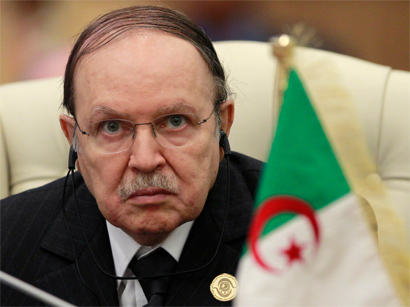Algerian opposition parties rallied several thousand supporters on Friday to call for a boycott of next month's election and to reject President Abdelaziz Bouteflika's run for another term after 15 years in power, Reuters reported.
Bouteflika, the 77-year-old veteran of Algeria's independence war, registered for the April 17 ballot despite suffering a stroke last year that opponents say has left him unfit to govern for another five years.
Chanting "Boycott" and "The people want the regime out," around 5,000 people packed in an Algiers sports stadium where Islamist leaders and secular parties denounced Bouteflika's bid and called for reforms to a political system they see as corrupt.
Friday's rally was a rare opposition gathering in the North African oil producer and OPEC member, where critics say rival clans of FLN elites and army generals have dominated politics behind the scenes since 1962 independence from France.
"The people here are the people who have been excluded, who have been put aside, but this is the real Algeria," Mohsen Belabes, a leader with the Rally for Culture and Democracy (RCD) party, told cheering crowds. "The regime will collapse, but Algeria will survive."
But with the backing of the powerful ruling National Liberation Front (FLN), army factions and business elites, Bouteflika is almost assured victory, even though he has rarely spoken or been seen in public since his illness last year.
After the Arab Spring uprisings across North Africa in 2011, Bouteflika ordered heavy spending from Algeria's oil earnings on housing, public services and other basic infrastructure to counter any social unrest.
Opposition parties remain weak and divided in the country, where memories of a 1990s war with armed Islamist militants remain painfully fresh, leaving many Algerians wary of instability and political upheaval.
At Friday's rally, rival Islamist and secular party supporters heckled and chanted at each other across the stadium in a reminder of splits between the RCD and the MSP Islamist party, who have been adversaries for years before both calling for the election boycott.
The appearance of Ali Belhadj, a Islamist hardliner from the banned Islamic Salvation Front, further stoked opposition divisions in Friday's crowd.
Six opposition parties said they will not participate in the election, which Bouteflika's critics believe is tilted in favor of his FLN party and Algeria's ruling political elites.
"Algeria today is not a kingdom, it is a private property," Abdullah Jaballah of the Islamist El Adala party told the rally. "How can a man who cannot even serve himself serve Algeria?"
STABILITY FOREMOST
The election and any potential transition in the OPEC member will be closely watched by Western powers who have relied on Bouteflika as a close ally in their campaign against Islamist militancy in the Maghreb.
Bouteflika's former prime minister Abdelmalek Sellal has stepped down to run the president's campaign. Even if he cannot campaign himself, though, loyalists portray Bouteflika as the guarantor of stability in a tumultuous region.
His supporters are quick to point to instability in Algeria's neighbors, where Tunisia, Libya and Egypt are still overcoming the turmoil triggered by their "Arab Spring" revolts to oust their own long-term leaders.
But Bouteflika's rare public appearances have generated opposition doubts about how he will campaign, how he will govern if he is still recovering, and what happens if he is forced to step down after winning the election.
Analysts expect any potential transition to be smoothly managed by the FLN and army factions who see themselves as guarantors of continuity. Already Bouteflika's supporters have talked about constitutional reforms to create a vice president post to be filled with an ally who can govern in his place.
With around $200 billion in foreign reserves from its energy sales, Algeria still has plenty of financial cushion for spending to ease any social tensions.
But Algeria needs reforms to open up its economy after years of centralized state controls and restrictions on foreign investment. The government needs to attract more foreign oil partners to help revive the stagnant energy production that accounts for most of state revenues.






